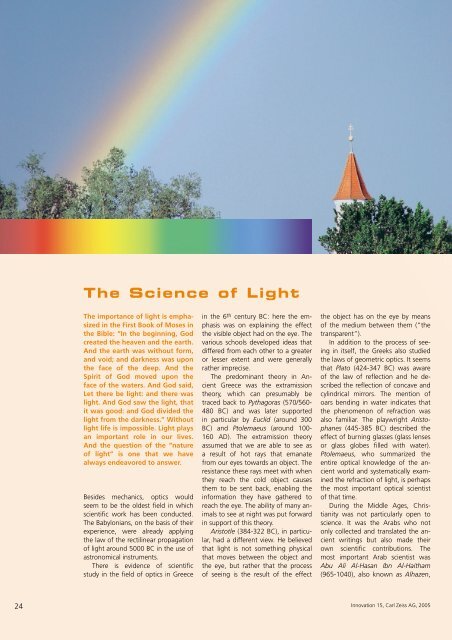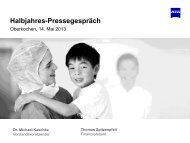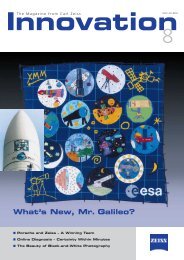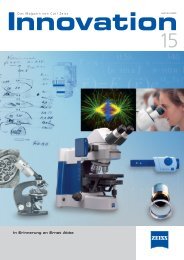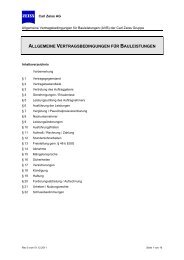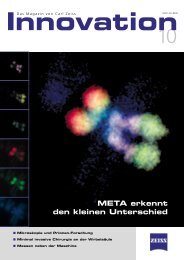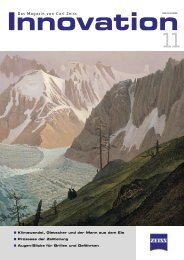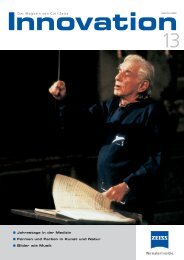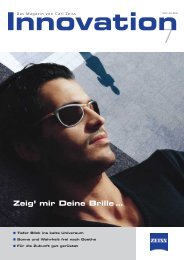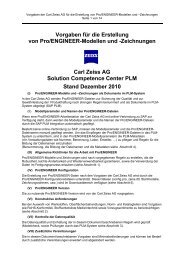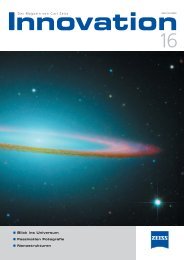Download PDF - Carl Zeiss
Download PDF - Carl Zeiss
Download PDF - Carl Zeiss
Create successful ePaper yourself
Turn your PDF publications into a flip-book with our unique Google optimized e-Paper software.
24<br />
The Science of Light<br />
The importance of light is emphasized<br />
in the First Book of Moses in<br />
the Bible: “In the beginning, God<br />
created the heaven and the earth.<br />
And the earth was without form,<br />
and void; and darkness was upon<br />
the face of the deep. And the<br />
Spirit of God moved upon the<br />
face of the waters. And God said,<br />
Let there be light: and there was<br />
light. And God saw the light, that<br />
it was good: and God divided the<br />
light from the darkness.” Without<br />
light life is impossible. Light plays<br />
an important role in our lives.<br />
And the question of the “nature<br />
of light” is one that we have<br />
always endeavored to answer.<br />
Besides mechanics, optics would<br />
seem to be the oldest field in which<br />
scientific work has been conducted.<br />
The Babylonians, on the basis of their<br />
experience, were already applying<br />
the law of the rectilinear propagation<br />
of light around 5000 BC in the use of<br />
astronomical instruments.<br />
There is evidence of scientific<br />
study in the field of optics in Greece<br />
in the 6 th century BC: here the emphasis<br />
was on explaining the effect<br />
the visible object had on the eye. The<br />
various schools developed ideas that<br />
differed from each other to a greater<br />
or lesser extent and were generally<br />
rather imprecise.<br />
The predominant theory in Ancient<br />
Greece was the extramission<br />
theory, which can presumably be<br />
traced back to Pythagoras (570/560-<br />
480 BC) and was later supported<br />
in particular by Euclid (around 300<br />
BC) and Ptolemaeus (around 100-<br />
160 AD). The extramission theory<br />
assumed that we are able to see as<br />
a result of hot rays that emanate<br />
from our eyes towards an object. The<br />
resistance these rays meet with when<br />
they reach the cold object causes<br />
them to be sent back, enabling the<br />
information they have gathered to<br />
reach the eye. The ability of many animals<br />
to see at night was put forward<br />
in support of this theory.<br />
Aristotle (384-322 BC), in particular,<br />
had a different view. He believed<br />
that light is not something physical<br />
that moves between the object and<br />
the eye, but rather that the process<br />
of seeing is the result of the effect<br />
the object has on the eye by means<br />
of the medium between them (“the<br />
transparent”).<br />
In addition to the process of seeing<br />
in itself, the Greeks also studied<br />
the laws of geometric optics. It seems<br />
that Plato (424-347 BC) was aware<br />
of the law of reflection and he described<br />
the reflection of concave and<br />
cylindrical mirrors. The mention of<br />
oars bending in water indicates that<br />
the phenomenon of refraction was<br />
also familiar. The playwright Aristophanes<br />
(445-385 BC) described the<br />
effect of burning glasses (glass lenses<br />
or glass globes filled with water).<br />
Ptolemaeus, who summarized the<br />
entire optical knowledge of the ancient<br />
world and systematically examined<br />
the refraction of light, is perhaps<br />
the most important optical scientist<br />
of that time.<br />
During the Middle Ages, Christianity<br />
was not particularly open to<br />
science. It was the Arabs who not<br />
only collected and translated the ancient<br />
writings but also made their<br />
own scientific contributions. The<br />
most important Arab scientist was<br />
Abu Ali Al-Hasan Ibn Al-Haitham<br />
(965-1040), also known as Alhazen,<br />
Innovation 15, <strong>Carl</strong> <strong>Zeiss</strong> AG, 2005


